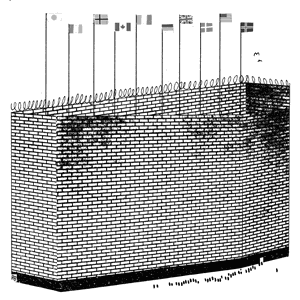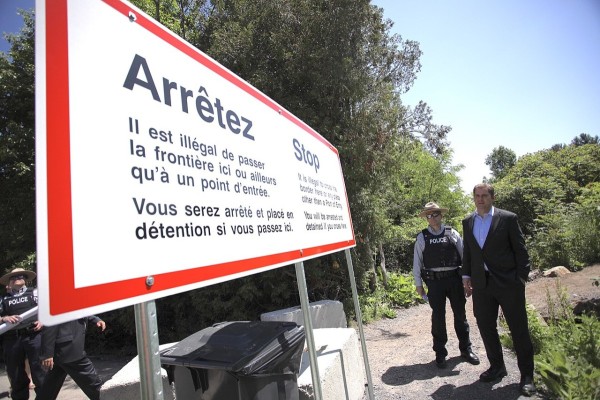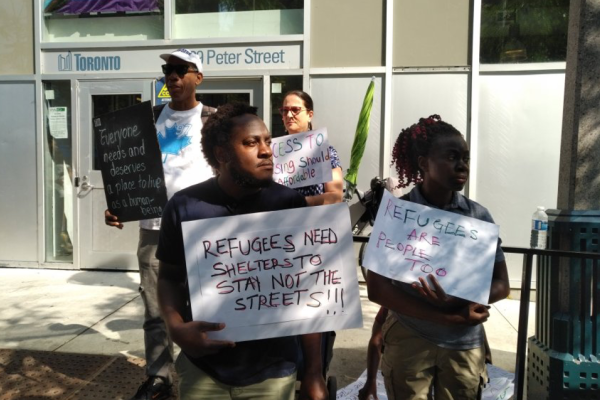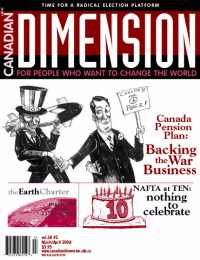Xenoracism and the Hypocrisy of Managed Migration
An interview with Liz Fekete of the Institute of Race Relations
CD: There are 125 million people who are displaced in this world. Who are these people? Where are they from? And what are the causes of their displacement?
LF: I think this figure represents people who have been displaced from all regions of the world for reasons connected to this phenomenon of globalization and the collapse of the Communist empire. People are being displaced by economic misery, escalating ethnic wars that have arisen through break-ups of old empires and increasing problems within countries whose borders were artificially defined by colonialism. They may have been displaced by ecological disasters, exacerbated by the kind of economic polices followed by the western world, or they may have been displaced because of globalization - the greed of those multinationals in pursuing their agenda and really stealing the resources of vulnerable countries, which are so open for theft. An example would be Nigeria, where the relentless pursuit for oil by the multinational companies leads them to hire armed militia to guard their projects. The militia are involved in attacking local communities, which then leads to their displacement.
Asylum Seekers or Economic Migrants?
CD: Displacement is not new in human history. People have been migrating since time began. So, what is so different about this epoch?
LF: When we look at the things that led to migration from Europe to the United States at the turn of the Twentieth Century and you look at the Irish community, you see the impact of the potato famine and the fact that people were actually forced off the land by the processes of industrial capital. Then I think that you can see a parallel between then and now, as people are being forced off land in Africa and China. So, we can see a similarity. But I think we need to distinguish between forced migration and voluntary migration.
In the post-war period, we had both migration from the former Commonwealth colonies to the U.K. and the movement of migrant workers around Europe. There were specific economic reasons that brought this up, but in a sense it wasn’t forced, and in certain situations it was forced. Ugandan Asians came to Britain because they were expelled by Idi Amin. But there is a difference when we are talking about this 125 million displaced people, as they are migrants with no choice, and this is increasingly important in the ferocious debate we have in Europe around asylum seekers and refugees because the powers-that-be see this 125 million displaced people and they demonize them, not as asylum seekers but as economic migrants. They say, “Oh they’re here because they are jealous of the western world. They want to drink at the fountains of capitalism,” and they present it as if people have a choice. For us, there is no distinction between an economic refugee and a political refugee!
CD: There have always been groups of people in the so-called West who’ve opposed the movements of the peoples of the global South to the North, yet there seems to have been a marked increase in anti-asylum-seeker rhetoric at all levels of the society. Why have things shifted so much?
LF: I think things have shifted because European societies are increasingly very selfish and looking out for their own.
Human Rights Only with Citizenship
CD: Some people would say they always have been looking out for their own. What is the difference today?
LF: They always have, but in the past there has been this veneer of human rights and democracy, and there is still very much that veneer of human rights and democracy. We are told that we are living in the cradle of the civilization that invented the concept of human rights. You will find this particularly if you go to France, where you are constantly told, “Equality, liberty, fraternity.”

But increasingly in Europe, human rights and civil liberties are being defined only in terms of the rights and liberties of European citizens. So, human rights are things that do not pertain in the Third World or the former Soviet Bloc. So, we have a sense of superiority to those societies, and increasingly the irony is that we don’t believe that those people who come to our countries who lack citizenship status are entitled to the same human rights and civil liberties within the framework of Europe. Over the last ten years, there has been a shift from policies designed to protect refugees to policies intended to reduce their numbers. The whole purpose of refugee law has become to deter asylum claims. Now, if you are saying that your refugee policy is based on deterrence, then you are not saying that your refugee policy is based on human rights. You can’t have one without the other.
If we look at the whole context in Europe, UN reports, population reports and people in the business community are all telling us that unless we allow immigrants into Europe our economies are unsustainable. We have an aging population. We have declining birth rates. Soon we won’t be able to maintain our welfare state. The pension schemes will collapse because there are going to be too many old people and not enough young people or middle-age people in work.
CD: So, Europe needs migrants.
LF: Europe absolutely needs migration, and the same is true all over the industrialized world! And yet it is like the state apparatus is in denial. Because immigration and asylum have become the sole issues that win and lose elections around Europe, even politicians who may be on the centre-left who may not necessarily be out-and-out racists and who know that we need immigration are too scared to come out and say it. Part of the problem in Europe is that there isn’t enough distinction anymore between centre-left and centre-right parties. The mainstream parties are becoming so alike. It’s like Tweedledum and Tweedledee in elections! And the whole area has become open for the far-right and anti-immigrant parties who come with the extreme anti-immigrant, anti-refugee agenda, force it to become the central political issue, and push the parties in the middle of the mainstream even further to the right so that eventually they come to accept a far-right agenda.
The second thing that is going on is what I would describe as the lack of any principle, any vision within the social-democratic parties of Europe. You have a situation where they’ve jettisoned ideology. You have Tony Blair talking about the Third Way, which is basically saying, “Ideology is finished. All we need is pragmatism” - what I would relate back to a tradition in this country that emerged in the 19th Century of Utilitarianism, you know, “The greatest pleasure of the greatest majority and the rest can go to the wall.” One hundred years ago, when the labour movement was formed in this country, the idea of international socialism and international justice was central. Today there is no concept of international socialism within the mainstream’s terms. No suggestion of solidarity with people from other parts of the world. Europe is engaged in an extremely, extremely selfish project, which is to ensure that Europe survives and leads in the age of globalization. So what Europe is actually saying is, “Yes, we need migrants. What we need desperately are highly skilled migrants. We need low-skilled immigration as well, in the sense that our service sector needs low-paid workers, etc.” But what they want is a migration policy that encourages the highly skilled workers, the computer wizards, the doctors and the nurses to come here. And those people can only come here if they can guarantee that their dependents won’t be a burden on the welfare state.
A Continuation of Colonialism
CD: Some critics would say, “Well, Ms. Fekete, what’s wrong with managed migration? Governments have to exert their agency. They have to be able to control the people coming in!”
LF: In the world I am searching for, there won’t be immigration controls. But we live in the real world. We live now. What is wrong with the whole concept of managed migration is the hypocrisy of it. Firstly, managed migration is a form of social-economic Darwinism. It’s about ensuring the survival of the fittest economies and allowing the rest of the world to go to pieces. It’s about creaming off the highly skilled, the educated workforces both of the former Soviet Union and countries in the Third World. These doctors, these nurses, these computer experts have been trained and educated at the expense of the poorer nations of this world and now they are encouraged to put their skills to the First World’s use. So, I would say managed migration is a continuation of the colonialism and imperialism that rampaged through the world stealing economic resources of Africa, of India - stealing the natural resources of the world. But now, what needs to be stolen is the resources in people, the educated people. Secondly, I would argue that immigration policy and refugee policy are two separate things. The First World has a duty to the displaced people of the world.
CD: Why?
LF: Because it has worked towards their displacement. This isn’t a separate world. Globalization isn’t a separate world. I’m using words like “First World” [and] “Third World” as easy ways into this argument, but they’re a lie - there is one world! There is one economic system! And that economic system is dominated by Europe, the United States and Japan. This economic system is creating these huge displacements of people, it’s rampaging through the world. So, we have a responsibility to those people we have displaced.
Now, either people in these parts of the world review globalization and say, “Right. We are not going to allow the free market to rampage through the world. This can’t go on. This is destructive. This is awful. We are going to come in and manage this system so that we don’t have refugee displacement. And where there is displacement of people the system will go in and do something to help them in their countries of origin.” Or, if we aren’t prepared to do that, then we’ve got to accept refugees, and that cannot be part of managed migration.
Xeno-Racism No Longer Colour-Coded
CD: A refugee is not somebody who can be viewed in terms of whether they are highly skilled or low-skilled or of economic benefit to the West. What’s that got to do with human rights? What’s that got to do with democracy?
LF: The crux of the argument is that they don’t want refugees who are poor peasants. They don’t want refugees who are the victims of torture and therefore have enormous emotional and psychological problems. They don’t want children. They don’t want women. They don’t want the grandparents. They just want the ones that can benefit the economy!
CD: What is xeno-racism?
LF: We deliberately use the term xeno-racism to distinguish it from xenophobia. Now xenophobia implies that racism is a psychological problem - a phobia against strangers. And the whole discourse is that this is natural.Everybody has a phobia against these strangers. But we are saying it is not xenophobia. It is xeno-racism.
I’ve been told by British legal experts on the global treatment of refugees that Canada is probably one of the leading countries of the world in terms of managed migration and the policies of refugee reduction. Europe is actually trying to borrow what happens in Canada. We have vast amounts of people getting to Europe to seek asylum, whereas Canada, ironically, which has this liberal face in terms of its refugee policy, has all these pre-entry controls, all these airline liaison officers posted around the world to make sure that refugees don’t get to Canada in the first place. But the ones that get in will probably be treated more liberally than the ones who get into Europe.
What we describe as xeno-racism, but also this hysteria about asylum seekers, is linked to the numbers who are actually getting to Europe. It’s a fact that the overwhelming majority of the world’s displaced people are actually cared for in their continents of displacement. So, all these countries in Africa and Asia are “looking after,” in whatever sense that they are looking after, and are managing displaced people, and only a tiny minority get to Europe. And yet, these figures are blasted all out of proportion!
Europe sees itseLF: as surrounded by these continents in absolute chaos. And if you look at places like Germany and Austria and Switzerland, the debate about asylum seekers is really the hysteria about what is happening in the former Soviet Bloc countries. The fear is that if the European Union enlarges they will be flooded by all of these people who want to come to the West. If you look at countries like Spain, Italy and Greece, the question that feeds the media - apart from Italy, which is obviously obsessed by Albania - is more what is happening in North Africa and the Maghreb.
And the important thing about the new xeno-racism is that it’s not colour-coded anymore. Xeno-racism is directed against people not just because of the colour of their skin, but because they are poor and destitute. It seems that society is teaching us to hate poor people, to see poverty as a crime. Asylum seekers are now the ones being criminalized.
It’s linked to this whole process of demonization. In the period of slavery they had to demonize Black people, and say they held certain characteristics and traits, to justify slavery. In the period of colonialism, they demonized the natives. In this period of globalization, they are demonizing asylum seekers to justify the economic processes that have led to this displacement of 125 million people.
This article appeared in the March/April 2006 issue of Canadian Dimension (Women Speaking Out).





_600_400_90_s_c1.jpg)
























































































